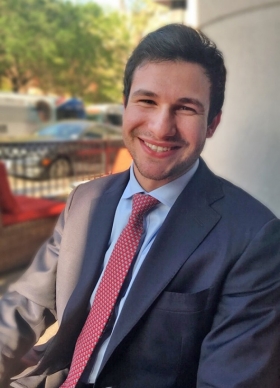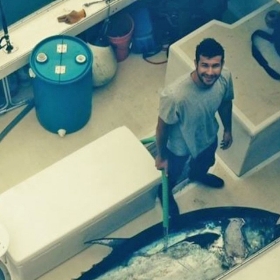“I always felt like I was really far from the rest of the world after crossing onto our island,” says Sentementes. “But having that separation from the mainland and being outside in nature every day was so important to me growing up.”
Now a political consultant based in Washington, D.C., Sentementes spent his summers as a youth and during college working as a lobster and tuna fisherman in nearby Casco Bay. He credits the challenging physical labour for his strong work ethic and problem solving skills, which he believes has led to much of his professional success today.
“Working 12 to 14 hours a day offshore, sometimes without a break, is a gruelling experience,” he says. “But I learned the importance of working hard and developed an attitude of no excuses. I have a lot of respect for the fishing community after having been one of them.”
Beyond instilling a strong work ethic, Sentementes says labouring on ships during high-intensity situations, often with crewmembers from vastly different backgrounds, taught him effective communication skills.
“Lobstering can be a dangerous job, especially in storms. You have to be in lock step with your crew or people get hurt,” he says. “It’s critical to build trust with people you sometimes barely know, and to communicate as clearly and precisely as you can to keep everyone safe and get the job done.”
It’s a skill that is proving invaluable in his current role.
“What I do now is wholly bipartisan and I work with people on both sides of the political aisle,” he says. “It’s obviously different than working with a crew on a ship, but the principles are the same. I am able to connect and communicate with people from across the United States regardless of ideologies, political experience and personal backgrounds.”
International politics
Sentementes developed an interest for international relations and politics at a young age, beginning when he attended international school in the Netherlands from the ages of three to six. Meeting other children from around the world kindled his curiosity and set him on his current path.
Another important influence was his father, who is involved in international trade, sourcing fabrics to China and Vietnam for companies such as Arc’teryx, Polartec and Primaloft. Family discussions frequently turned to politics and global events. Sentementes was regularly encouraged to participate, even as a child.


 Zach Sentementes is a senior associate at Advanced Advocacy, a public affairs firm based in Washington, D.C. | Photo: Zach Sentementes
Zach Sentementes is a senior associate at Advanced Advocacy, a public affairs firm based in Washington, D.C. | Photo: Zach Sentementes
 Zach Sentementes spent his youth and summers as an adult working on lobster and tuna fishing boats in Maine’s Casco Bay. | Photo: Zach Sentementes
Zach Sentementes spent his youth and summers as an adult working on lobster and tuna fishing boats in Maine’s Casco Bay. | Photo: Zach Sentementes